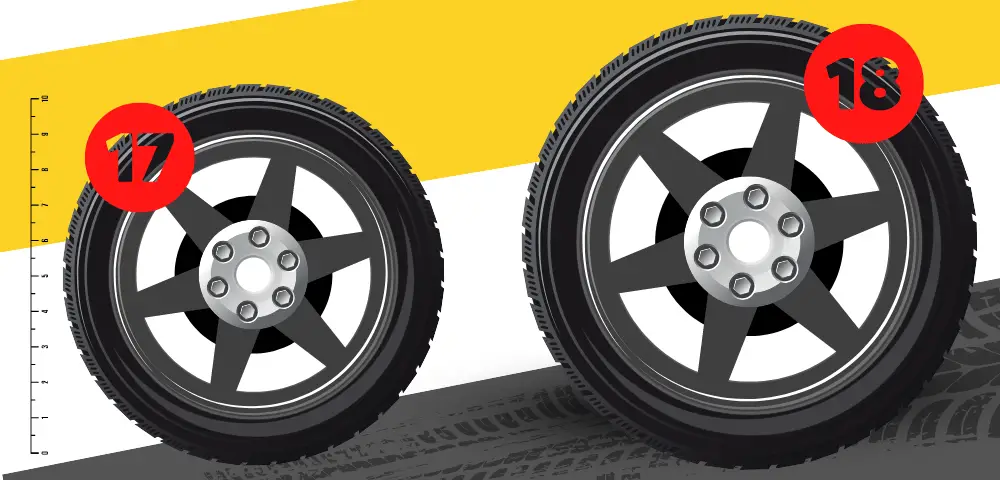If you’re new to the world of cars, you’d believe that stock wheels are the only option when it comes to getting new cars.
However, opting for a slightly larger or smaller wheel is possible in most cars and sometimes it delivers better performance.
The following text will compare the performance of 17 and 18-inch wheels for cars that allow it and discuss some of the main merits and demerits of opting for smaller or larger diameter wheels.
17 vs 18-inch Wheels: The Main Differences
A 17-inch wheel is typically smaller and lighter compared to an 18-inch wheel.
This results in a smoother ride as the vehicle suspension system has to absorb less weight and is less impacted by rough road surfaces.
The smaller wheel size also provides better shock absorption due to the lower profile of the tire.
This is because the tire has more sidewall to absorb impact and reduce vibrations that would otherwise be transmitted to the vehicle’s suspension.
Additionally, smaller wheels are more flexible and therefore more capable of adapting to different road conditions, which translates to a more comfortable ride.
On the other hand, an 18-inch wheel offers better handling and stability.
The larger wheel size and better tread width provide more grip and stability, especially in high-speed driving conditions.
The larger wheel also provides more stability and reduces the risk of a blowout or other tire-related problems, which can be beneficial in terms of safety.
Furthermore, larger diameter wheels provide a more aggressive look and improved performance compared to smaller wheels.
In simpler terms, it makes your vehicle stand out and look cooler.
Tire Type, Suspension, and Other Important Parameters to Consider
The type of tire also affects the ride quality of a vehicle.
Typically, 17-inch wheels come with lower-profile tires that offer better grip and handling.
18-inch wheels, on the other hand, have higher profile tires that provide a smoother and more comfortable ride.
Apart from having higher or lower profile tires, the tire design also plays a role in ride comfort, with some tires providing better traction and stability, while others offer a quieter and more comfortable ride.
Additionally, the type of tire and vehicle suspension system also play a role in determining the ride quality of a vehicle.
Ultimately, the best way to determine the ride quality of a vehicle is to test-drive it and compare it to other vehicles with different wheel sizes.
How does Wheel Size Affect Fuel Efficiency?
When it comes to fuel efficiency, 17-inch wheels are typically better as they are lighter and reduce the overall weight of the vehicle. However, 18-inch wheels are generally more aerodynamic, which also contributes to better fuel efficiency.
In the end, the choice between 17 and 18-inch wheels will depend on your needs and preferences.
If a comfortable and smooth ride is a priority, then 17-inch wheels are the better option. If performance, stability, and handling are more important, then 18-inch wheels may be a better choice.
Which One’s the Better Choice Between 17 and 18-inch Wheels?
There is no clear answer to this as the ride quality of a vehicle is determined by various factors. Wheel size is one of those factors along with the suspension and tire quality.
While it’s true that the size of the wheel has a significant impact on ride comfort.
However, it’s impossible to generalize the performance of 17-inch and 18-inch wheels as they have their own distinct advantages and disadvantages.
Advantages of 17-inch wheels
Here are the main advantages that make 17-inch wheels a viable option for your car.
- Improved Ride Quality: 17-inch wheels are lighter and have a lower profile, which helps absorb road vibrations and provide a better-quality ride.
- Better Shock Absorption: The lower profile of 17-inch wheels absorbs more impact, which reduces the overall vibrations for the car’s suspension.
- Better Fuel Efficiency: Lighter 17-inch wheels reduce the overall weight of the vehicle, which improves fuel economy and reduces emissions.
- Increased Tire Flexibility: 17-inch wheels provide more tire flexibility, which allows the tire to adapt better to different road conditions and provide a more comfortable ride.
- Lower Cost: 17-inch wheels are typically less expensive compared to 18-inch wheels, which can make them a more budget-friendly option.
Disadvantages of 17-inch wheels
There are a few demerits of using 17-inch wheels as well. Here are a few main ones.
- Reduced Stability: 17-inch wheels provide less stability and grip because of their lower tread width, resulting in poor performance at higher speeds.
- Poor Traction: The lower profile tires typically used with 17-inch wheels can have poor traction in wet or slippery conditions, reducing the overall safety of the vehicle.
- Reduced Brake Performance: The smaller size of 17-inch wheels can limit the size and type of brakes that can be installed, reducing overall braking performance.
- Advantages of 18-inch wheels
- Here are the main advantages of using 18-inch wheels:
- Improved Handling and Stability: 18-inch wheels provide improved handling and stability, especially in high-speed driving conditions.
- Better Traction: The wider tires typically used with 18-inch wheels provide better traction and stability.
- More Aggressive Look: They are excellent if you prefer to stand out from the crowd.
- Improved Brake Performance: The larger size of 18-inch wheels allows for the installation of larger and more advanced brakes.
- Better Aerodynamics: 18-inch wheels have a more aerodynamic design.
Disadvantages of 18-inch wheels
Using 18-inch wheels have a few cons as well. Here are a few:
- Reduced Ride Quality: The larger and heavier 18-inch wheels can transmit more road vibrations, resulting in a rougher ride.
- Higher Cost: 18-inch wheels are typically more expensive compared to smaller wheel sizes, which can make them a less budget-friendly option.
- Reduced Shock Absorption: The higher profile tires typically used with 18-inch wheels have less sidewall to absorb impact, resulting in reduced shock absorption.
- Increased Vehicle Weight: The larger size and weight of 18-inch wheels can increase the overall weight of the vehicle, which can result in reduced fuel efficiency and increased emission
- Limited Tire Availability: 18-inch wheels may have limited tire options, which can make it more challenging to find suitable tires for the vehicle.
Notice something? You’ll see that the main advantages and disadvantages of 17 and 18-inch wheels mirror each other.
For instance, 17-inch wheels don’t have enough stability, but their 18-inch counterpart has improved handling and stability.
Similarly, 18-inch wheels don’t offer much in terms of shock absorption, but 17-inch wheels are the opposite of that.
17 vs 18-inch Wheels: The Final Verdict
So, which wheel option is the better choice for your car? Are 17-inch wheels better or is it the other way around?
The right answer depends on your personal preference and driving style.
17-inch wheels generally provide a smoother ride, better fuel efficiency, and are lighter in weight compared to 18-inch wheels.
However, they also have a smaller contact patch with the road and offer less grip, which can be a disadvantage in performance driving.
On the other hand, 18-inch wheels provide better handling and braking performance, as they offer a larger contact patch with the road and provide more grip.
They also enhance the look of the vehicle and allow for bigger brakes to be fitted.
However, they can produce a harsher ride and reduce fuel efficiency due to their heavier weight.
Ultimately, it’s important to consider the trade-offs and choose the right size for your driving needs and preferences.


